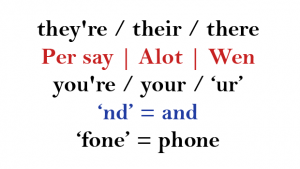Brushing Up on Your Grammar at Work
 When you’re looking for a job or applying to grad school, it’s always a good idea to double check the spelling and grammar of every email and letter you submit. But what about the rest of the time? What about me versus I? Spelling errors or lapses in grammar may not matter much in quick texts and emails, but what about informal public spaces, like Twitter? What about the work place?
When you’re looking for a job or applying to grad school, it’s always a good idea to double check the spelling and grammar of every email and letter you submit. But what about the rest of the time? What about me versus I? Spelling errors or lapses in grammar may not matter much in quick texts and emails, but what about informal public spaces, like Twitter? What about the work place?
Managers are fighting an epidemic of grammar gaffes in the workplace. Many of them attribute slipping skills to the informality of email, texting and Twitter where slang and shortcuts are common. Such looseness with language can create bad impressions with clients, ruin marketing materials and cause communications errors.
There’s no easy fix. Some bosses and co-workers step in to correct mistakes, while others consult business-grammar guides for help. In a survey conducted earlier this year, about 45% of 430 employers said they were increasing employee-training programs to improve employees’ grammar and other skills. Some employees use templates to eliminate mistakes and are implementing training programs in business writing.
The evidence points mostly to the younger workers for this basic writing skills gap resulting from the lack of grammar rules associated with texting and social networking. Also, some grammar rules aren’t clear, leaving plenty of room for disagreement. Some firms are requiring all job applicants, including those who do lower level jobs, to pass spelling and grammar tests before they will hire them. Some firms require employees to have at least two other people copy-edit and make corrections to every important email and letter that goes out. There is clear evidence that the grammar issue is a growing concern in the work force.
Long ago it was difficult to find material that hadn’t been professionally copy-edited. Today, it is actually hard to put your hands on something that HAS been professionally copy-edited.
What are the risks of using bad grammar at work? They range from 25-cent fines from a manager for each use of “like” at some companies to losing major clients, confusing the customers, and messing up marketing materials so badly that expensive reprints are required–if they can even be done in time. There are numerous reasons why grammar mistakes can be costly to a business.
The new age of Twitter, texting, and social media has changed the way we communicate in our social lives but it is becoming clear that the informal language and poor grammar that is acceptable in this “new age” has had an impact on performance in the business world. Let’s face it! The job market is competitive. There is no time like the present for brushing up on your grammar rules.
Follow Us: Facebook – Twitter – YouTube – LinkedIn
